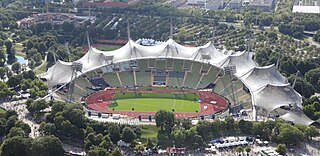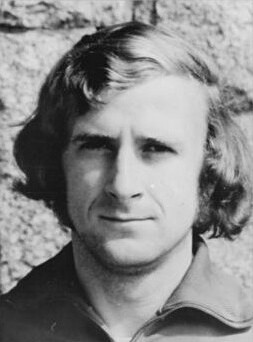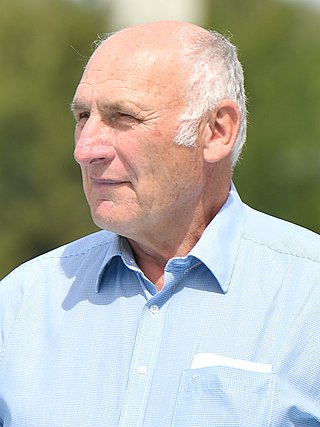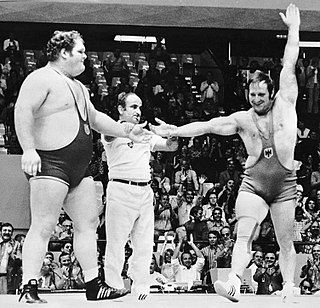Jochen Feldhoff (born 10 September 1943) is a former West German handball player who competed in the 1972 Summer Olympics.
In 1972 he was part of the West German team which finished sixth in the Olympic tournament. He played two matches. [1]
Jochen Feldhoff (born 10 September 1943) is a former West German handball player who competed in the 1972 Summer Olympics.
In 1972 he was part of the West German team which finished sixth in the Olympic tournament. He played two matches. [1]

The Munich massacre was a terrorist attack carried out during the 1972 Summer Olympics in Munich, West Germany, by eight members of the Palestinian militant organization Black September. The militants infiltrated the Olympic Village, killed two members of the Israeli Olympic team, and took nine others hostage, who were later killed after a failed rescue attempt.

The 1972 Summer Olympics, officially known as the Games of the XX Olympiad and officially branded as Munich 1972, were an international multi-sport event held in Munich, West Germany, from 26 August to 11 September 1972.

The 1972 Summer Paralympics, the fourth edition of the Paralympic Games, were held in Heidelberg, West Germany, from 2 to 11 August 1972. The games ended 15 days before the 1972 Summer Olympics held in Munich, also in West Germany.

The 1972 Summer Olympics, officially known as the Games of the XX Olympiad, took place in Munich, West Germany, from 26 August through 11 September 1972. A total of 7,134 athletes from 121 National Olympic Committees (NOCs) competed in 195 events from 23 sports.

Olympiastadion is a stadium located in Munich, Germany. Situated at the heart of the Olympiapark München in northern Munich, the stadium was built as the main venue for the 1972 Summer Olympics.

The United Team of Germany was a combined team of athletes from West Germany and East Germany that competed in the 1956, 1960 and 1964 Winter and Summer Olympic Games. In 1956, the team also included athletes from a third Olympic body, the Saarland Olympic Committee, which had sent a separate team in 1952, but in 1956 was in the process of joining the German National Olympic Committee. This process was completed in February 1957 after the admission of Saarland into West Germany.

The Judo competition at the 1972 Summer Olympics was the return of the sport following its absence at the 1968 Summer Olympics in Mexico City. Medals were awarded in six weight classes, and competition was restricted to men only. Among the highlights was Wim Ruska of the Netherlands winning gold medals in both the heavyweight and open class competition, becoming the first judoka to win two Olympic gold medals.

The men's ice hockey tournament at the 1972 Winter Olympics in Sapporo, Japan, was the 12th Olympic Championship. Games were held at the Makomanai Ice Arena and at the Tsukisamu Indoor Skating Rink. The Soviet Union won its fourth gold medal. The United States won the silver, while Czechoslovakia won the bronze. Canada did not send a team to the event for the first time since ice hockey was first competed at the Olympics in 1920, instead competing with and defeating the Soviets in a competition later that year known as the Summit Series. Canada would not send a men's hockey team to the Olympics until 1980.

The 1972 Olympic football tournament, held in Munich, Augsburg, Ingolstadt, Nürnberg, Passau, and Regensburg, was played as part of the 1972 Summer Olympics. The tournament features 16 men's national teams from five continental confederations. The 16 teams are drawn into four groups of four and each group plays a round-robin tournament. At the end of the group stage, the top two teams advanced to the second group stage, where the second-placed teams in each group advanced to the bronze medal match while the first-placed teams advanced to the gold medal match held at Olympic Stadium on 10 September 1972.

Hans-Jürgen "Hansi" Kreische is a former East German footballer.
At the 1972 Summer Olympics in Munich, seven events in sprint canoe racing were contested, and for the first time at the Olympic Games, four events in slalom canoeing were also contested, at the Augsburg Eiskanal.
Klaus Steinbach is a former World Record holding and Olympic freestyle swimmer from Germany. He swam for Germany at the 1972 and 1976 Olympics.

Athletes from Germany have taken part in most of the modern Olympic Games held since 1896. Germany has hosted three Olympic Games, in 1936 both the Winter and Summer Games, and the 1972 Summer Olympics. In addition, Germany had been selected to host the 1916 Summer Olympics as well as the 1940 Winter Olympics, both of which had to be cancelled due to World Wars. After these wars, Germany was banned from participating in the 1920, 1924 and 1948 Olympics.
Wolfgang Hottenrott is a competition rower and Olympic champion for West Germany.
Peter Berger is a German rower who competed for West Germany in the 1968 Summer Olympics and in the 1972 Summer Olympics.

Hans-Johann Färber is a German rower who competed for West Germany in the 1968 Summer Olympics, 1972 Summer Olympics and in the 1976 Summer Olympics.

Gerhard Auer was a German rower who competed for West Germany in the 1972 Summer Olympics.
Alois Bierl is a German rower who competed for West Germany in the 1972 Summer Olympics.

Wilfried Dietrich was a German heavyweight wrestler. Between 1956 and 1972 he took part in five Olympics and six world championships, often entering both the freestyle and Greco-Roman wrestling contests – a feat unmatched by any other wrestler. He won five Olympic and five world championship medals, becoming an Olympic (1960), World (1961) and European champion (1967). Between 1955 and 1962 he won all his freestyle bouts.

The hijacking of Lufthansa Flight 615 was an aircraft hijacking that occurred on 29 October 1972 and aimed at the liberation of the three surviving perpetrators of the Munich massacre from a West German prison.